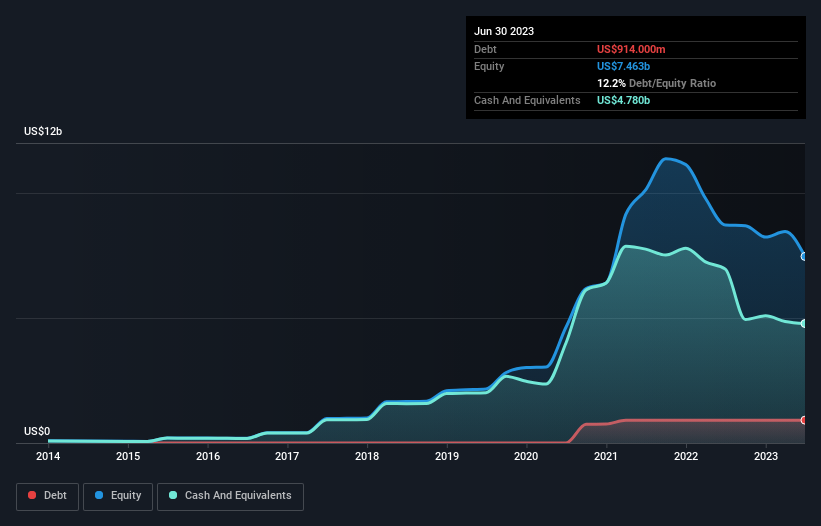Howard Marks put it nicely when he said that, rather than worrying about share price volatility, 'The possibility of permanent loss is the risk I worry about... and every practical investor I know worries about.' It's only natural to consider a company's balance sheet when you examine how risky it is, since debt is often involved when a business collapses. As with many other companies Shopify Inc. (NYSE:SHOP) makes use of debt. But should shareholders be worried about its use of debt?
What Risk Does Debt Bring?
Debt assists a business until the business has trouble paying it off, either with new capital or with free cash flow. Part and parcel of capitalism is the process of 'creative destruction' where failed businesses are mercilessly liquidated by their bankers. However, a more common (but still painful) scenario is that it has to raise new equity capital at a low price, thus permanently diluting shareholders. Of course, debt can be an important tool in businesses, particularly capital heavy businesses. The first thing to do when considering how much debt a business uses is to look at its cash and debt together.
Check out our latest analysis for Shopify
What Is Shopify's Net Debt?
As you can see below, Shopify had US$914.0m of debt, at June 2023, which is about the same as the year before. You can click the chart for greater detail. But on the other hand it also has US$4.78b in cash, leading to a US$3.87b net cash position.

How Healthy Is Shopify's Balance Sheet?
The latest balance sheet data shows that Shopify had liabilities of US$880.0m due within a year, and liabilities of US$1.36b falling due after that. Offsetting this, it had US$4.78b in cash and US$809.0m in receivables that were due within 12 months. So it can boast US$3.35b more liquid assets than total liabilities.
This short term liquidity is a sign that Shopify could probably pay off its debt with ease, as its balance sheet is far from stretched. Succinctly put, Shopify boasts net cash, so it's fair to say it does not have a heavy debt load! There's no doubt that we learn most about debt from the balance sheet. But ultimately the future profitability of the business will decide if Shopify can strengthen its balance sheet over time. So if you want to see what the professionals think, you might find this free report on analyst profit forecasts to be interesting.
In the last year Shopify wasn't profitable at an EBIT level, but managed to grow its revenue by 26%, to US$6.3b. With any luck the company will be able to grow its way to profitability.
So How Risky Is Shopify?
Although Shopify had an earnings before interest and tax (EBIT) loss over the last twelve months, it generated positive free cash flow of US$125m. So taking that on face value, and considering the net cash situation, we don't think that the stock is too risky in the near term. We think its revenue growth of 26% is a good sign. There's no doubt fast top line growth can cure all manner of ills, for a stock. When I consider a company to be a bit risky, I think it is responsible to check out whether insiders have been reporting any share sales. Luckily, you can click here ito see our graphic depicting Shopify insider transactions.
If, after all that, you're more interested in a fast growing company with a rock-solid balance sheet, then check out our list of net cash growth stocks without delay.
New: Manage All Your Stock Portfolios in One Place
We've created the ultimate portfolio companion for stock investors, and it's free.
• Connect an unlimited number of Portfolios and see your total in one currency
• Be alerted to new Warning Signs or Risks via email or mobile
• Track the Fair Value of your stocks
Have feedback on this article? Concerned about the content? Get in touch with us directly. Alternatively, email editorial-team (at) simplywallst.com.
This article by Simply Wall St is general in nature. We provide commentary based on historical data and analyst forecasts only using an unbiased methodology and our articles are not intended to be financial advice. It does not constitute a recommendation to buy or sell any stock, and does not take account of your objectives, or your financial situation. We aim to bring you long-term focused analysis driven by fundamental data. Note that our analysis may not factor in the latest price-sensitive company announcements or qualitative material. Simply Wall St has no position in any stocks mentioned.
About NasdaqGS:SHOP
Shopify
A commerce technology company, provides tools to start, scale, market, and run a business of various sizes in Canada, the United States, Europe, the Middle East, Africa, the Asia Pacific, and Latin America.
Excellent balance sheet with proven track record.
Similar Companies
Market Insights
Community Narratives



